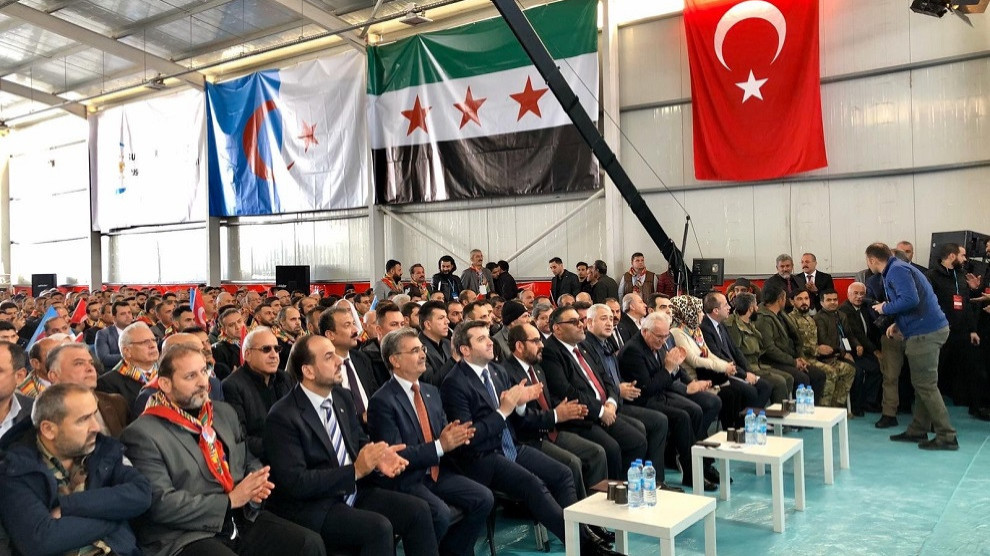Turkey begins - similar to Jarablus, Afrin, Azaz and al-Bab - to institutionalize the annexation of Serêkaniyê (Ras al-Ain) and Girê Spî (Tal Abyad). Abdullah Erin, the governor of the Northern Kurdistan province of Urfa, announced at a press conference yesterday the appointment of Turkish officials as district governors to Serêkaniyê and Girê Spî.
Having displaced some 300,000 people from the two cities and the surrounding areas on the Turkish border, the Turkish state is now working to settle in these areas people brought in from different areas.
Establishment of an occupation administration
The Governor of Urfa argued the following at yesterday’s press conference: "The supply of drinking water, energy, medicine and infrastructure has begun and people are returning home quickly.” He confessed that the Turkish state is planning a permanent presence in the region.
On the same day, Hami Aksoy, spokesman for the Turkish Foreign Ministry, said: "We reserve the right to continue Operation Peace Spring. As our President has said, we will not leave Syria until it has been cleared of the terrorist."
The current phase is quite comparable to what happened in Hatay in 1938. At that time, under pressure from Turkey, the region was first declared an 'independent state' and then annexed by Turkey. The annexation was preceded by a massive settlement policy to win a referendum on the annexation of Hatay. A similar process is now taking place in Northern Syria. The AKP regime tries to settle "Turkmen" population from all over the world in Girê Spî and Serêkaniyê.
The "Turkmen" settlement
In this context, a meeting called "5th Ordinary Congress of the Syrian Turkmen Council" took place on 24 October 2019 in Turkish-occupied Azaz city. The Turkish state called on the "Turkmens" in other areas to "return" to the occupied territories. Turkish Deputy Foreign Minister Yavuz Selim Kıran also took part in the meeting and stated: "The Turkmen cause must be further strengthened. We will continue our determined struggle to provide them with a safe area and to return it to the true owners of the region and to the displaced.”
Muhammed Vecih Cuma, chairman of the Turkmen Council in Syria, which is controlled by Turkey, said: "If a safe area is established, we are ready to return to our homeland very quickly and in masses. We are ready to take our destiny into our own hands."
The so-called transitional government
The Turkish state has formed a "Syrian Transitional Government", headed by Abdulrahman Mustafa. This transitional government legitimized the crimes of the Sultan Murad Brigade by claiming that the criticism resulted from the international community's concern about their success.
Four parties united
The Turkish Parliament President Mustafa Şentop sent a message of congratulations to the meeting at which the Syrian Turkmen National Movement Party, the Syrian Turkmen Mass Party, the Syrian-Turkmen Nahda Party and the Vefa Party forged the aforementioned alliance. The meeting was attended by so-called delegates from Aleppo, Latakia, Tartous, Idlib, Hama, Homs, Damascus, Golan and Raqqa. At the meeting the delimitation of "Turkmen" territory in Syria was discussed, even a flag and a hymn were spread.
The militias of the Turkish state
The Turkish state stationed “Turkmen” groups in strategic locations in the northern Syrian border region. These are the Sultan Murad Brigade, the Sultan Sulaiman Shah Brigade, the Fatih Sultan Mehmet Brigade, the Muntassir Billah Brigade and the Samarkand Brigade. The Arab groups, on the other hand, are sent to the front to invade the region.
Some radical-Islamist mercenary families brought in from East Turkistan, Turkmenistan, Uzbekistan, Tajikistan, Azerbaijan and Afghanistan are settled in these areas under the name of “Turkmens”.
At the moment these groups are located in Idlib’s Jabal Akrad, Jabal Turkman, Bab al-Hawa border crossing, Antarib, in Afrin’s Jindires, Bilbilê and Shera districts, at the Bab al-Salama border crossing in Azaz, in the areas near the border in Jarablus and in the five-kilometer-wide strip on the border in Girê Spî and Serêkaniyê.
Relocation of people from Central Asia to Rojava
Just a few weeks after the occupation of Serêkaniyê and Girê Spî, the "Turkification" of the region has begun. According to current information, the Directorate General of the Turkish Migration Authority has begun to prepare the resettlement of families from the "Turk States" in Central Asia to the two northern Syrian cities.
In Istanbul, Hatay, Antep and Urfa, the Turkish Directorate General of Migration, coordinated by the Turkish secret service MIT, has begun to prepare for resettlement in shelters for refugees in the occupied corridor from Serêkaniyê to Girê Spî.
According to current information, the MIT is meeting with radical Islamists who have migrated to Turkey from so-called Turk states such as East Turkistan, Turkmenistan, Uzbekistan, Tajikistan, Azerbaijan and even Afghanistan in order to convince them for the resettlement.














